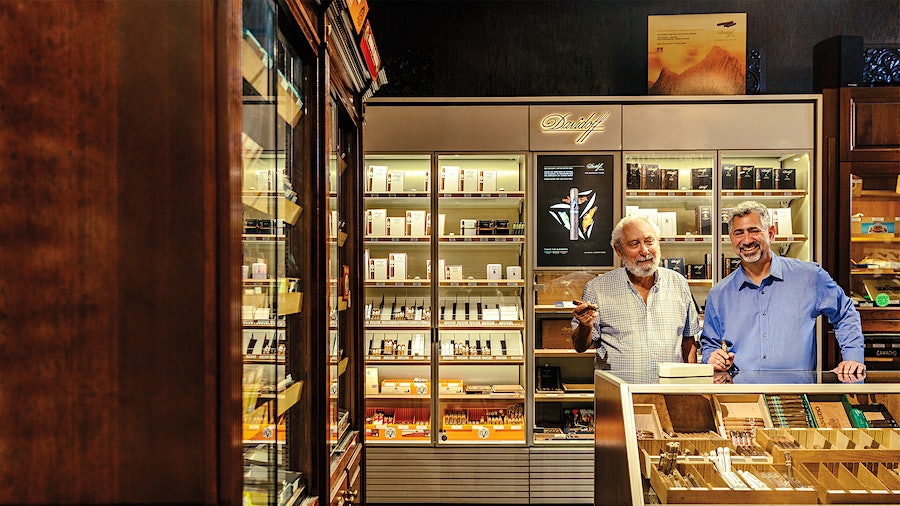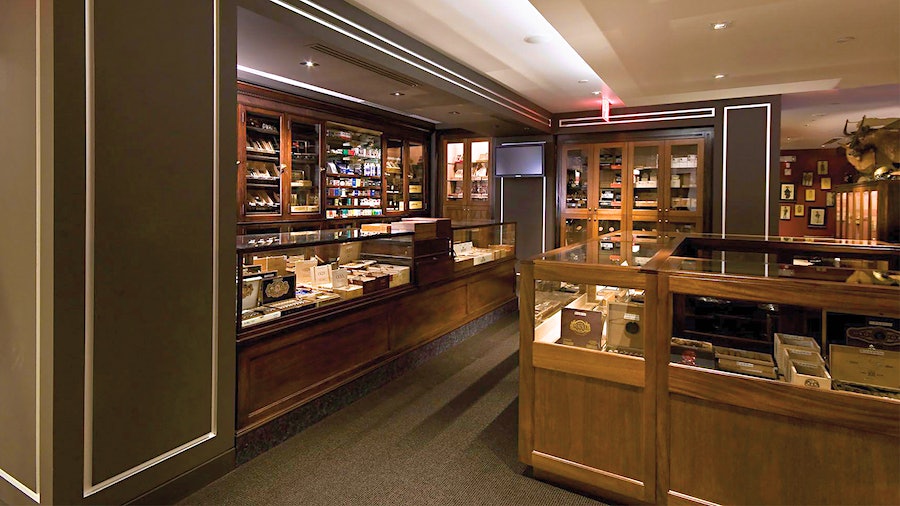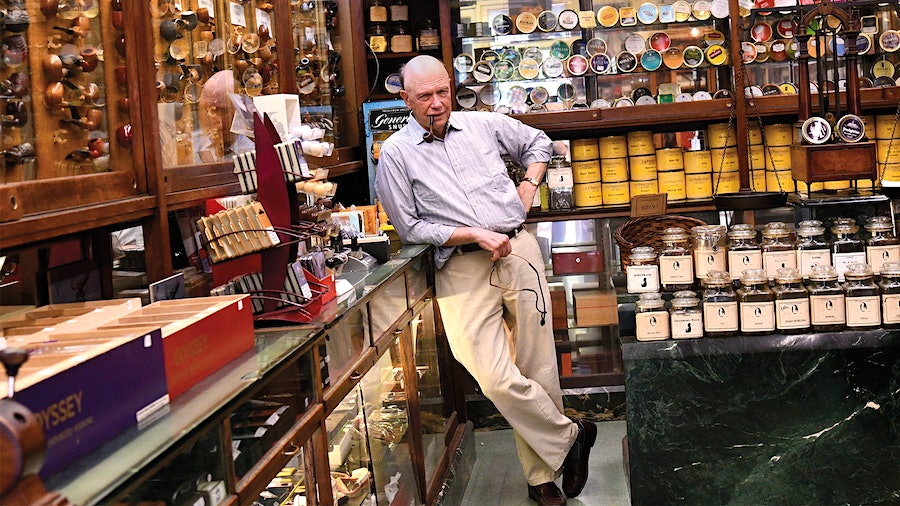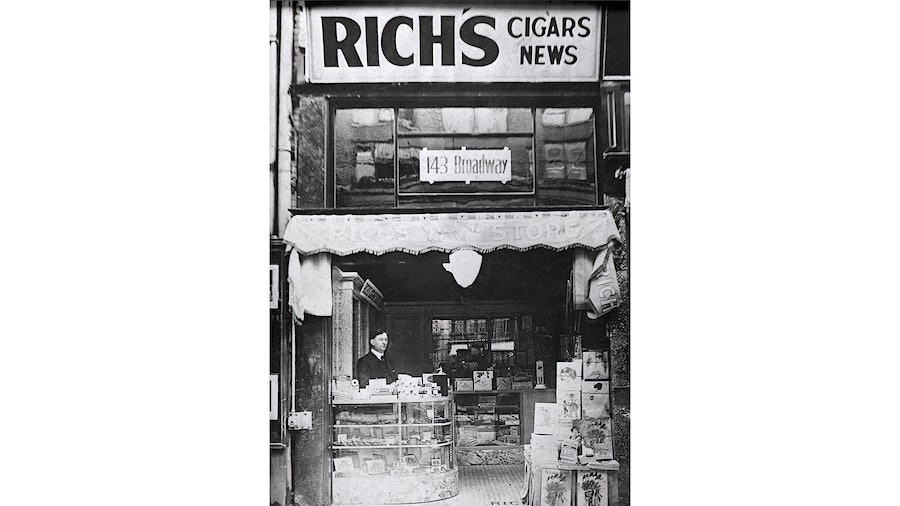Ye Olde Cigar Shops
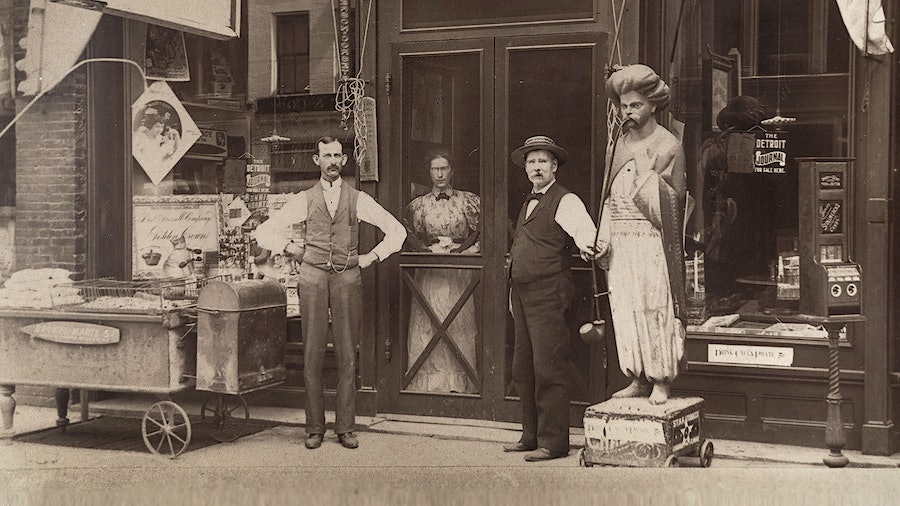
Iwan Ries & Co.
Chicago • Founded 1857
“Don’t kill each other.” That’s the half-joking reply from Kevin Levi, the general manager of the nation’s oldest tobacco shop, when asked the secret to maintaining a family business for five generations and counting. Chuck, his father and the president, concurs: “We’ve had a rule going way back that we do not discuss business outside of office hours.”
“Way back” is a relative term for the custodians of a retail legacy that began before the Civil War. For Kevin, it means at least a quarter century at the shop and for Chuck 63 years.
Within its long history, the business has undergone several changes in leadership, location, focus and even its name. The German immigrant Edward Hoffman founded E. Hoffman & Co. as a shop inside a hotel, with a sideline making pipe tobacco. In 1891, he brought in his nephew from Germany, Iwan Ries, to the thriving business. In 1898, when Ries took the reins, he decided to sell the manufacturing business. However, the sales agreement stipulated relinquishing the Hoffman name and, with Hoffman’s blessing, the store was reborn as Iwan Ries & Co. In 1929, Iwan’s daughter Rosalie married Stanley Levi, who became an apprentice and later the proprietor. The couple’s sons, Richard and Chuck, would join the business, the latter taking over daily operations in 1988.
Two other open secrets to the success of Iwan Ries include having an immense selection and providing impeccable service. “You need to carry a huge inventory so you’ll have the selection the customer wants. You have to have fair prices. And you have to have outstanding service,” says Chuck. Iwan Ries carries more than 15,000 pipes, a massive array of pipe tobacco and over 100 brands and 1,000 varieties in a 2,500-square-foot cigar room.
The customer base spans from blue-collar workers to corner-office executives. And the current Wabash Avenue location, situated within Chicago’s Loop, reflects that diversity with its Iwan Ries Cigar Lounge. Comprising three different rooms, it offers one space with a board-room ambience, a second that resembles a sports bar and another that is a luxurious club room.
With longevity comes dedicated customers, says Kevin. “We’re fifth generation owners here, but we have third- to fourth-generation shoppers.” While Chucks adds, “There are fortunately a whole lot of people out there who still want service.”
—Garrett Rutledge
Chaloner’s Cigar House
Adrian, Michigan • Founded 1874
When Charles Chaloner came to America, he made shoes. But his New World dream was fated to change. Shifting gears, he went on to found what is now the oldest cigar shop in the state of Michigan.
After arriving from England, the craftsman toiled and saved for 16 years to start Chaloner & Co. (pronounced “chawl-ner”), which opened in 1874 dealing in very different commodities: candy, fresh popcorn and roasted nuts as well as cigars. But Chaloner sought to distinguish the shop for its tobacco. He found his solution in a painted, six-foot-tall wooden statue of a man in a turban and robes smoking a pipe. Affectionately nicknamed “The Turk,” the statue stood outside the shop for decades.
In the 1920s, city officials demanded The Turk’s removal, claiming it impeded pedestrian traffic. The Chaloner family resisted, but one night, The Turk mysteriously disappeared. It was recovered from a garbage dump and returned to the store, this time placed inside for security. Since 1976, it has been on permanent loan to a museum. A replica resides in the store.
After Chaloner’s death in 1906, his children, William H. and Laura, ran the shop until William’s son Bill and his wife Mildred took ownership in 1939. Bill gained the distinction of making the first long-distance phone call from Adrian (to a supplier in New York City, no less).
Since 1977, Chaloner’s has changed hands several times and is now owned by David Pilmore and Scott Westfall, who renovated the shop as part of a larger Adrian revitalization project. “We certainly wanted to honor those who came before us, and the Chaloner family is really what we want to pay homage to,” says Westfall. Bill’s grandson Curt was invited to give his blessing.
An adjacent building was purchased where events are hosted in cigar lounges, with a bar, pool table and waterfall. On one floor, the 70-year-old popcorn machine still pops kernels and on the other floor, the 100-year-old nut roaster stands on display.
—Thomas Pappalardo
W. Curtis Draper Tobacconist
Washington, D.C. • Founded 1887
Given its long history of serving a neighborhood that includes the seat of national government, it is no surprise that W. Curtis Draper Tobacconist enjoys the patronage of many illustrious clients. However, it is discreet about naming names. Once, during an interview with the New York Times, the part owner John Anderson was peppered with such requests. The journalist, who was seated with her back to the door, never saw both a professional basketball coach and a Supreme Court justice walk in and do their cigar shopping.
Draper’s, a mere a four-minute walk from the White House and in close proximity to Capitol Hill, has long been a natural draw for politicians, statesmen, celebrities and just plain sightseers. Founded by William Curtis Draper in 1887, the business focused on pipes and pipe tobacco. Draper sold to Bill Martin, an accountant by trade, who had helped him run the business. Under Martin, the cigar side of the business grew.
Following Martin’s death in 1990, his wife, Francis, and his store manager, John “Duke” Cox, handled the business for the next several years. In 1999, Cox and Anderson bought the store from Francis Martin. When Cox retired in 2003, store manager Matt Krimm became Anderson’s partner.
Over the years, the shop has moved several times but since 2010 has been just one block over (on 15th Street) from the original 14th-Street site. That same year, Krimm and Anderson also purchased Bethesda Tobacco, establishing a second location.
Draper’s close proximity to the White House does have its drawbacks. Following the 9/11 terrorist attacks on the World Trade Center and Pentagon, the store was suddenly aswarm with members of the Secret Service in full tactical gear, demanding the store be closed immediately. Ultimately, the establishment shuttered for an entire week. Even after that, due to the road closures, Anderson’s usual seven-mile commute home turned into five hours sitting in traffic.
When asked what it’s like to shepherd such a long-standing institution, Anderson states, “It’s an honor and a privilege. That’s why I joined the board of directors for the PCA [Premium Cigar Association], to help protect our industry and retailers around the country for the next generation. It’s an amazing industry and I’m proud to be a part of it.”
—T.P.
Straus Tobacconist
Cincinnati • Founded 1880
“There’s a little romance in picking up cigars, looking at pipes, smelling the pipe tobaccos, touching and feeling and holding, that’s all part of the experience we offer as brick-and-mortar stores. That’s being lost online,” says James Clark, owner of Straus Tobacconist since 1991. The shop has captured the hearts of aficionados in the Cincinnati area since 1880, remaining in the same storefront since 1905.
Its roots can be traced in two directions—both of which share a name. The Straus brothers opened Straus Tobacconist in 1880. Around the same time in Cincinnati, Henry Straus (no relation) ran a wholesale cigar company. The two companies would remain separate until the 1970s, when the gods of fate had satisfied their amusement and allowed the destined merger of the businesses.
In what seems to be yet another tale of fate, James Clark, a 12-year employee and then-manager of Straus Tobacconist, bought the company when it went up for sale in 1991. The unsuspecting Clark was sitting on a winning ticket as the ’90s brought the cigar boom and changed this tobacco shop forever.
Burgeoning success led to the birth of a second location. In 2000, Clark opened a storefront in Florence, Kentucky, across the Ohio River. According to Clark, the two Straus locations offer a yin and yang dynamic in terms of the customers they serve. “There’s brick, and there’s mortar,” says Clark. “Brick is Macanudo, Montecristo, Upmann, Padrón, Fuente, Ashton, Oliva. The mortar is all the new stuff, all the boutique stuff. We [the Cincinnati shop] are more brick-oriented as far as inventory and they [the Florence location] are more mortar-oriented.”
Though reluctant at first, Clark decided to add smoking lounges at both stores. “You have to provide these customers a place to come and smoke, you have to, or there’s no reason for them to come and see you,” says Clark. The move has set up Straus Tobacconist for success in the area. But for Clark, he’s grateful for the present as well: “I am fortunate that I was able to take over a 100-year-plus old business.”
—G.R.
L.J. Peretti Co.
Boston • Founded 1870
Retailers dream of attracting hordes of customers. When it happens, it can have its drawbacks. When Boston’s L.J. Peretti greeted the boy band New Kids on the Block at the height of their popularity in the 1990s, the ensuing crush of worshipful (and under-age) girls forced the venerable shop to barricade its doors to protect it from the swarm.
On other occasions, L.J. Peretti has greeted—without incident—many celebrities in its 152 years, including Frank Sinatra, Bing Crosby, Mickey Rooney, Edward G. Robinson, Basil Rathbone and rock star Steve Perry. In fact, the present owner, Stephen Willett, recalls the opposite occurring once in the 1970s. At the time, he worked the sales register part time as a graduate student. One day, the store was so crowded with customers that nobody noticed actors Walter Matthau and Jack Lemmon smoking cigars at the end of the counter.
The city landmark’s origin story dates from 1870, when Libero Joseph Peretti arrived from Lugano, Switzerland, and established the Peretti Cuban Cigar Co. in the historic North End of Boston. He went on to open the Peretti Cigar Factory in 1892, making clear Havana cigars until 1934. The business took over its current location near Boston Common in 1938.
The shop, which serves a town well-supplied with tweedy academics, is also famous for its pipes and pipe tobaccos. As well as importing brands from across the globe, it has created more than 250,000 blends for which Libero’s son Joseph was renowned. His Thanksgiving Day Blend, created in 1939, is sold to this day, starting every November 1.
The torch was passed to the third generation. Robert Peretti worked side-by-side with Willett for many years before the latter became full owner in 2000. Despite the change in the proprietor’s last name, the spirit of the original owners remains. The shop retains its original appearance, with its fixtures and marble cases intact. Its big tobacco blending bench still stands upstairs. “When I bought the store, I told Bob Peretti it’s a privilege . . . We strive to please our customers in the tradition of Peretti’s,” Willett told Cigar Aficionado.
—T.P.
Leavitt & Peirce
Cambridge, Massachusetts • Founded 1883
Inside the wooden walls of Leavitt & Peirce, the aroma of pipe tobacco sparks the imagination of visitors. The layered smell takes one back through time, and speculation arises about which renowned figures once perused this mainstay of the Harvard community. Maybe a young John F. Kennedy bought his cigars here as an undergrad? How many Nobel Peace Prize winners or famous writers have entered this store? Surely there must be some. The seemingly endless list of notable Harvard alumni intrigues the mind’s need to play the ‘what if?’ game.
Located near Old Harvard Yard, Leavitt & Peirce is one of the few establishments that have endured for 100-plus years in Cambridge across the Charles River from Boston. Fred Leavitt and Waldo Peirce founded it in 1883 and owned the shop until 1920. Around 1950, two Harvard graduates, the Ehrlich brothers, bought Leavitt & Peirce. In the late 1970s, the surviving Ehrlich brother would sell the store to then-manager Paul Macdonald Sr., who had run the store since the early years of that decade. A few years later, Macdonald would bring on his son, Paul Macdonald Jr., to run Leavitt & Peirce. Paul Jr. has passionately managed the store ever since, becoming the owner in 2001.
Leavitt & Peirce is not your traditional tobacco shop. The store has the feel of a living museum. The walls are adorned with Harvard antiques and local relics, the shelves filled with products thought to be long gone. Tobacco goods and cigars remain the backbone of the business, but old-fashioned shaving kits, classic board games and wooden chess boards are also a draw. “In the face of a fast-changing world, this place is still the same,” says Paul Jr. “We know what our niche is and we build on that.”
A connection with customers and the community has always been the secret ingredient. “Our loyal customers, who I love, they’re almost like family,” says Paul Jr. “I always say no service is what people are going to go for if they get bad service, and that means online. Service has to be our differentiator, and it is. I’m a retailer, I was born to be a retailer.”
—G.R.
Rich’s Cigar Store
Portland, Oregon • Founded 1894
For a Portland, Oregon-based cigar shop to have a worldwide reputation is quite impressive, yet for Rich’s Cigar Store, it’s simply part of their identity. Out-of-towners account for about as much foot traffic as the locals at the 128-year-old, preeminent tobacco retailer of the Pacific Northwest.
“Given that people know us around the world, it really highlights the value of having a very well-known brand,” says Marty Moran, one of the store’s proprietors.
Rich’s opened in Portland in 1894, founded by B.B. Rich. The store remained in the Rich family until the mid-1970s when it was bought by Tom Moran, who had been a Rich’s employee for eight years. The Moran family, with Tom’s wife Elaine and their son Marty, still run the company.
For years, a core element of Rich’s business model was news and magazine sales, with the store once carrying more than 2,300 titles. It was a synergistic profit machine as people stopped in for their morning fix of news and smokes on the way to work. As times changed, they discontinued periodicals and dove deeper into their tobacco operations, creating a smoking lounge.
Rich’s has two locations in Portland, a flagship site, with the lounge, and a smaller shop nearby. They compete head-on with the online retailers, nipping at their heels by shipping nationwide and carrying an in-house inventory that includes more than 1,500 cigars and one of the largest selections of pipe tobacco in the country. The company also employs a chief tobacconist, Bill Schindler, who generally operates out of the flagship store. “We carry a lot of stock so people can come in here and shop like they’re in one of the big-box online retailers,” says Marty.
The business instinct has been the store’s competitive edge. “Businesses that endure go through a lot. We go through a lot of change slowly, but at the same time we’re very adaptable,” said Marty. “There are just some standards that businesses that endure must follow. That’s please your customers . . . and make sure that you’re supporting your community via a good service.”
—G.R.
